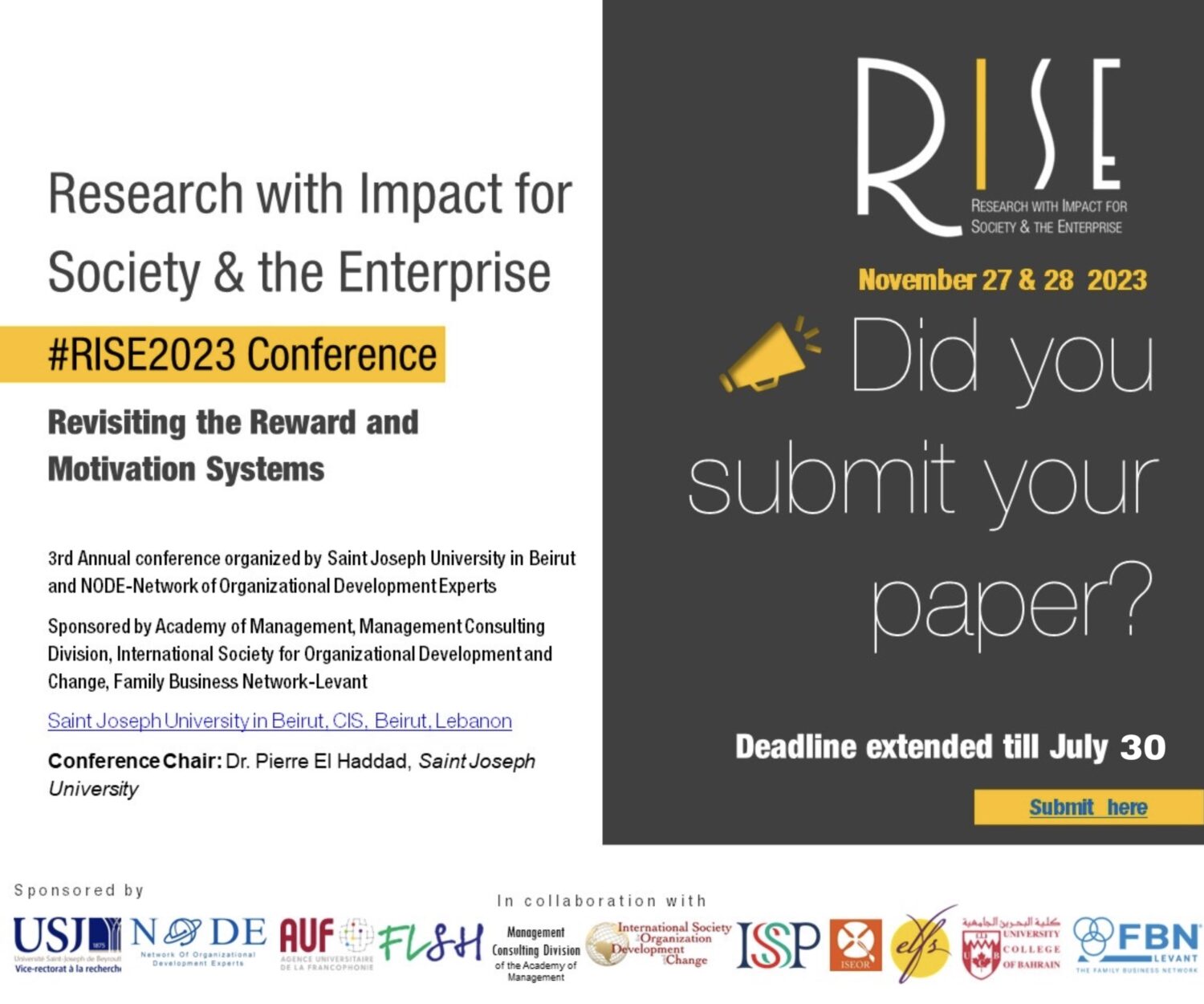Research with Impact for Society and the Enterprise
#RISE2023 Conference
“Revisiting the Reward and Motivation Systems”
Saint Joseph University in Beirut
Beirut, Lebanon, November 27-28, 2023
The human person is intrinsically social. Companies, administrations, and associations cannot reform, transform, or reveal their potential while adopting erroneous theories that reduce the human drive to self-interest.
Organizations are anthropological fields. They are the engine of value creation and the source of income for society. Their performance is contingent on the amount of intelligence, experience, and education of the workforce, but also the social connections. Economic motivation intertwines with sociological, psychological, and aesthetic cues.
Citizens, workers, and managers are highly social beings, yet self-interest is pervasive in reward systems. Reward systems have been blindsided by the doctrine that workers are only motivated by their self-interest and the misconception that friendly, agreeable workplaces provide well-being. They fail to read the interest of human nature in the fortune of others.
Neuroscience has demonstrated that far less self-interested than commonly thought. It has shown beyond the shadow of a doubt that material well-being is transient. Being respected and valued are social rewards that the human brain experiences exactly like material rewards. Lacking respect, recognition, and being left out is experienced like physical pain. It has also shown that caring for and giving to others, supporting fellow workers, volunteering, having friends, seeing neighbors, and other social goods, have more impact on the productivity of people than self-interested reward. Well-being in the workplace requires psychologically safe environments which allow decoding one’s and others’ motivations and acting upon them. Incorporating the social dimensions with the economic dimension brings psychological safety and well-being to the people and enhances the organizational bottom line.
Reward systems have blindsided this phenomenon and disregarded care, or outright pitched people against each other. There are certainly some contexts in which financial incentives increase performance, but there are others in which money actually produces small or no performance improvement. Increasing productivity is about optimizing individual intelligence and hard work through social connections in the organization. Recognition, certainty, empowerment, belongingness, and fairness have demonstrable effects on the bottom line. Enhancing those factors is a low-cost and efficient strategy to improve workplace outcomes.
Reward systems are also contingent on cultural differences. Being likable to others is deprecated as conformity in a certain mindset while in others it is praised as harmony. Impersonal pro-sociality is more valued and guilt is stronger in individualistic communities, while shame is more punishing and interpersonal pro-sociality is more valued in kin-based societies.
The conference committee invites papers and workshops that tackle improving the quality of management in general, and the reward system in particular. The committee favors practice-oriented papers and invites scholars, consultants, practitioners, and doctoral students to submit their abstracts before June 30, and their full papers before August 15, 2023.
Conference Chair:
Dr. Pierre El Haddad, Professor of Management, Management Consultant, Researcher in Organization Development pierre.elhaddad@mach-consultants.com
Submission:
Papers have to be submitted here
Call for Papers Timeline:
Scientific Committee:
Carole Bousquet
Charbel Bassil
Eric Sanders
Farah Homsi
Jennifer Abou Hamad
Jeremy Salmeron
Mona Rizkallah Hardane
Nabil Badr
Najoie Nasr
Rana Sawaya
Rida Elias
Rima Maawad
Chair of Scientific Committee: Dr. Pierre El Haddad pierre.elhaddad@mach-consultants.com
Organizing Committee:
Gabriel Habib
Gaetana Abi Saab
Hilda Bairamian
Marwa Halwani
Roula Chehab
Shant Estepan
Chair of Organizing Committee: Dr. Hilda Bairamian hilda.bairamian@usj.edu.lb


